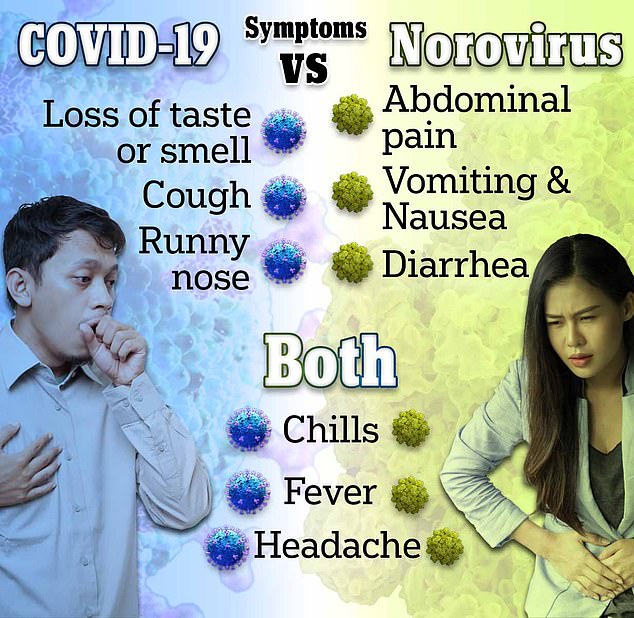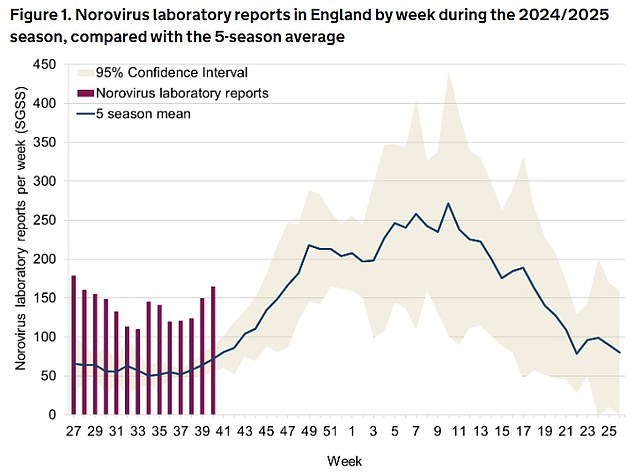Britons were today warned not to take a common painkiller to combat norovirus.
Cases of winter vomiting, which can also cause diarrhoea, have increased by more than 40 per cent in just a fortnight, figures show.
Health chiefs fear any further rise in norovirus could put further pressure on the NHS before the winter flu season reaches its peak.
Health bosses often recommend rest and drinking plenty of fluids. Paracetamol can also relieve fever or aches and pains.
But experts have now advised people to stay away from ibuprofen for fear it could irritate the stomach lining.
The non-steroidal anti-inflammatory drug (NSAID) could even increase the risk of stomach bleeding and ulcers in British people who suffer from vomiting.
This is because the medication reduces the production of prostaglandins (hormone-like substances made by the body) that protect the stomach lining.
Savneesh Bhogal, Healthcare Expert at Netex, said: ‘Avoid taking ibuprofen as it should not be taken on an empty stomach and you may not feel like eating.’
Figures released yesterday by the UK Health Security Agency (UKHSA) revealed that cases of the winter virus increased by 41 per cent in just a fortnight.

Experts have now advised people to stay away from ibuprofen for fear that it may irritate the lining of the stomach.
“While ibuprofen should not be taken on an empty stomach as it can disrupt the lining, paracetamol is safe.
“There is no treatment for norovirus, so you have to let it run its course.”
According to figures published yesterday by the United Kingdom Health Security Agency (UKHSA), this year’s norovirus outbreak is much more virulent than previous seasons.
Winter virus cases increased by 41 percent in just a fortnight. This is double the five-year average for the same two weeks.
Since the start of the 2024/2025 season, the number of norovirus outbreaks reported in hospital settings is also 37 percent higher than the five-year average.
However, the actual case numbers, which only cover England, despite being compiled by the UKHSA, may be even higher.
This is because the figures are based on positive laboratory reports and NHS hospitals reporting suspected and confirmed norovirus outbreaks.
Most of those infected suffer nausea, diarrhea and vomiting and recover at home.

Norovirus may appear similar to Covid symptoms, with both viruses causing chills, fever and headaches.
The virus is spread through close contact with someone infected; touching surfaces or objects that have the virus on them and then touching your mouth; as well as eating food that has been handled by someone with norovirus.
Regular handwashing is the best way to stop the spread.
Norovirus can show symptoms similar to Covid, with both viruses causing chills, fever and headaches.
The stomach virus usually goes away on its own in two or three days.
But patients, who may also experience pain in their arms and legs, are advised to stay home until 48 hours after their symptoms have resolved.
However, in severe cases, some people may need to be hospitalized, with the elderly and children most at risk.
Gauri Godbole, deputy director of gastrointestinal infections at the UKHSA, said: “We are approaching the winter season with higher than usual norovirus levels and we expect norovirus to spread further in the coming weeks.
‘Recently, we have seen the largest increase in cases in adults, especially those aged 65 and older.
‘To help reduce the spread of norovirus, steps can be taken to avoid transmitting the infection.
‘If you have diarrhea and vomiting, do not return to work, school, or daycare until 48 hours after your symptoms have gone away, and do not prepare food for others during that time.
“If you are unwell, avoid visiting people in hospitals and nursing homes to avoid spreading the infection in these settings.”


